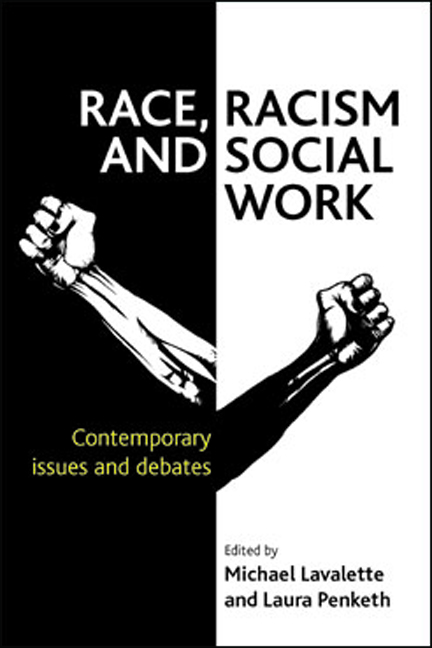Book contents
- Frontmatter
- Contents
- Notes on contributors
- Acknowledgements
- Dedication
- Some terms and definitions
- Introduction: Race, racism and social work
- one Rethinking anti-racist social work in a neoliberal age
- two The growth of xeno-racism and Islamophobia in Britain
- three The catalysers: ‘black’ professionals and the anti-racist movement
- four “Same, same, but different”
- five Antisemitism and anti-racist social work
- six Anti-Roma racism in Europe: past and recent perspectives
- seven In defence of multiculturalism?
- eight Social work and Islamophobia: identity formation among second and third generation Muslim women in north-west England
- nine Institutionalised Islamophobia and the ‘Prevent’ agenda: ‘winning hearts and minds’ or welfare as surveillance and control?
- ten ‘Street-grooming’, sexual abuse and Islamophobia: an anatomy of the Rochdale abuse scandal
- eleven My people?
- twelve Twenty-first century eugenics? A case study about the Merton Test
- thirteen The role of immigration policies in the exploitation of migrant care workers: an ethnographic exploration
- Conclusion: Race, racism and social work today: some concluding thoughts
- Bibliography
- Index
four - “Same, same, but different”
Published online by Cambridge University Press: 01 February 2022
- Frontmatter
- Contents
- Notes on contributors
- Acknowledgements
- Dedication
- Some terms and definitions
- Introduction: Race, racism and social work
- one Rethinking anti-racist social work in a neoliberal age
- two The growth of xeno-racism and Islamophobia in Britain
- three The catalysers: ‘black’ professionals and the anti-racist movement
- four “Same, same, but different”
- five Antisemitism and anti-racist social work
- six Anti-Roma racism in Europe: past and recent perspectives
- seven In defence of multiculturalism?
- eight Social work and Islamophobia: identity formation among second and third generation Muslim women in north-west England
- nine Institutionalised Islamophobia and the ‘Prevent’ agenda: ‘winning hearts and minds’ or welfare as surveillance and control?
- ten ‘Street-grooming’, sexual abuse and Islamophobia: an anatomy of the Rochdale abuse scandal
- eleven My people?
- twelve Twenty-first century eugenics? A case study about the Merton Test
- thirteen The role of immigration policies in the exploitation of migrant care workers: an ethnographic exploration
- Conclusion: Race, racism and social work today: some concluding thoughts
- Bibliography
- Index
Summary
In this chapter Harrison and Burke look at shifting anti-racist discourses from antiracism, to anti-oppressive practice and on to notions of ‘cultural competencies’. They trace this shifting debate through a range of perspectives, including the work of black feminists, the assertion of black perspectives, a focus on human rights and engagement with the service-user movements. The chapter includes discussion of the challenges facing social work educators (academics), who have tried to include this discourse in education and training in a way that makes it meaningful for professional practice.
What is crucial to such a vision of the future is the belief that we must not merely change the narratives of our histories, but transform our sense of what it means to live, to be, in other times and different spaces, both human and historical. (bhabha 1994: 256)
Introduction
In Hanoi, as in many cities where tourists are plentiful, hawkers have developed ingenious ways of trying to persuade you to buy something, often exactly the same object that you are holding prominently in your hand! When one such vendor approached one of the authors (Philomena)on a trip to the city, Philomena held up a previous purchase and said, with confidence, “See, I already have one!” The reply came, “Yes, yes, this one same, same, but different!” So began a dialogue about the nature of ‘sameness’ and ‘difference’.
Using this theme of similarity and difference, the authors will critically evaluate the three areas of anti-racist practice, cultural competence and anti-oppressive theorising, and engage in an informed discussion of how these different ways of conceptualising and addressing racial discrimination have influenced social work practice.
Responses to oppression and inequality are not only informed by our similar and different lived experiences but also by our belief that responses to social issues are inherently political and require an analysis that recognises the specificity of particular forms of oppression as well as how intersections and interconnections between the various oppressions are played out in the lives of individuals, families, groups and communities.
- Type
- Chapter
- Information
- Race, Racism and Social WorkContemporary Issues and Debates, pp. 71 - 84Publisher: Bristol University PressPrint publication year: 2013



